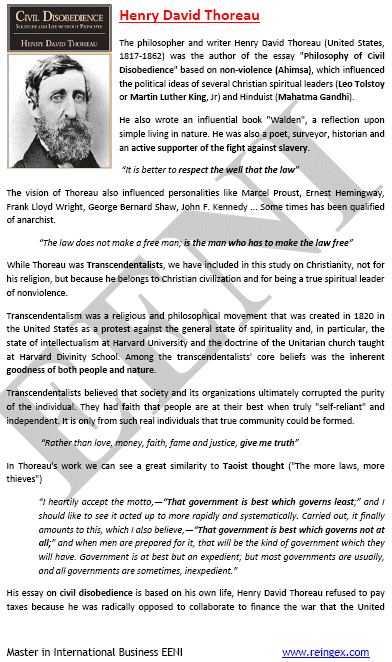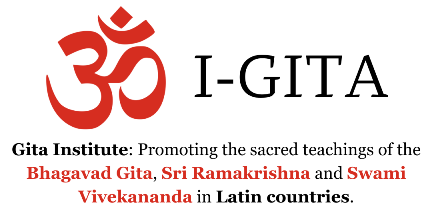Henry Thoreau, Ethics, Civil Disobedience

Philosophy of Civil Disobedience (Henry Thoreau) Non-Violence. Gandhi, Luther King
- Henry David Thoreau (American Philosopher)
- Philosophy of Civil Disobedience
- Concept of the Non-Violence of Henry David Thoreau and their influence on Gandhi, Leo Tolstoy, and Martin Luther King
Henry Thoreau - Philosophy of Civil Disobedience

The Subject “Henry Thoreau - Philosophy of Civil Disobedience” belongs to the following Online Programs taught by EENI Global Business School:
Doctorate: Ethics, Religions & Business.
Bhagavad Gita Courses: Karma Yoga, Bhakti Yoga, Jnana Yoga, Dhyana Yoga, Realization of the Gita
Course: Christianity & Business.
Languages:  or
or  Henry Thoreau
Henry Thoreau  Henry Thoreau
Henry Thoreau
 Henry Thoreau.
Henry Thoreau.

“The law does not make a free man; is the man who has to make the law free” Henry David Thoreau
The philosopher and writer Henry David Thoreau (United States, 1817-1862) was the author of the essay “Philosophy of Civil Disobedience” based on the Non-Violence (Ahimsa), which influenced the political ideas of several Christian spiritual leaders (Leo Tolstoy or Martin Luther King) and Hinduism (Mahatma Gandhi).
He also wrote an influential book “Walden” a reflection upon simple living in nature. He was also a poet, surveyor, historian and an active supporter of the struggle against slavery.
“It is better to respect the well that the law” Henry David Thoreau
His essay on civil disobedience is based on his life; Henry David Thoreau refused to pay taxes because he was radically opposed to collaborating to finance the war that the U.S. was unleashing against Mexico and maintaining an economic system based on the slavery, one of the largest embarrassments of the Western Civilization.
“If the alternative is to keep the fair in prison or give up war and slavery, the State will not hesitate to choose. We must move towards peaceful revolution based on the non-violence” Henry Thoreau
“Rather than love, money, faith, fame, and justice, give me truth” Henry Thoreau

Influence on Gandhi. Hinduism influenced on Thoreau.
“In the morning I wash my intelligence in the breathtaking and cosmogonal thinking of the Bhagavad Gita - Hinduism.
Moreover, if we compare the Bhagavad Gita with which the modern world and its Literature seem weak and insignificant” Henry David Thoreau
It is interesting to point out this mutual influence:
The eternal religion, Hinduism, inspires a spiritual leader of the Western Civilization, Thoreau.
This Hindu philosophy merges with their ideas and emerges the concept of “Civil Disobedience,” which will return to India to influence in one of the leaders of the spiritual renewal of Hinduism: Mahatma Gandhi.
In Thoreau's work; we can see a significant similarity to Taoist thought (“The more laws, more thieves”).
“That Government is best which governs least” Henry David Thoreau
Henry David Thoreau also transmits in his works the concept of detachment from material goods, so common in the Asian religions (Buddhism, Jainism, Zoroastrianism).
“Luxury and comfort are not indispensable, are an obstacle to spiritual elevation of humanity” Thoreau
The vision of Thoreau also influenced personalities like Marcel Proust, Ernest Hemingway, Frank Lloyd Wright, George Bernard Shaw, John F. Kennedy. In 1998, President Clinton recognized the principle of civil disobedience as alternatives to violence.
While Thoreau was Transcendentalists; we have included in this study on Christianity, not for his religion, but because he belongs to Christian Civilization and for being a true spiritual leader of the Non-Violence.
Religions and Business - Christians Spiritual Leaders.

(c) EENI Global Business School (1995-2024)
We do not use cookies
Top of this page




